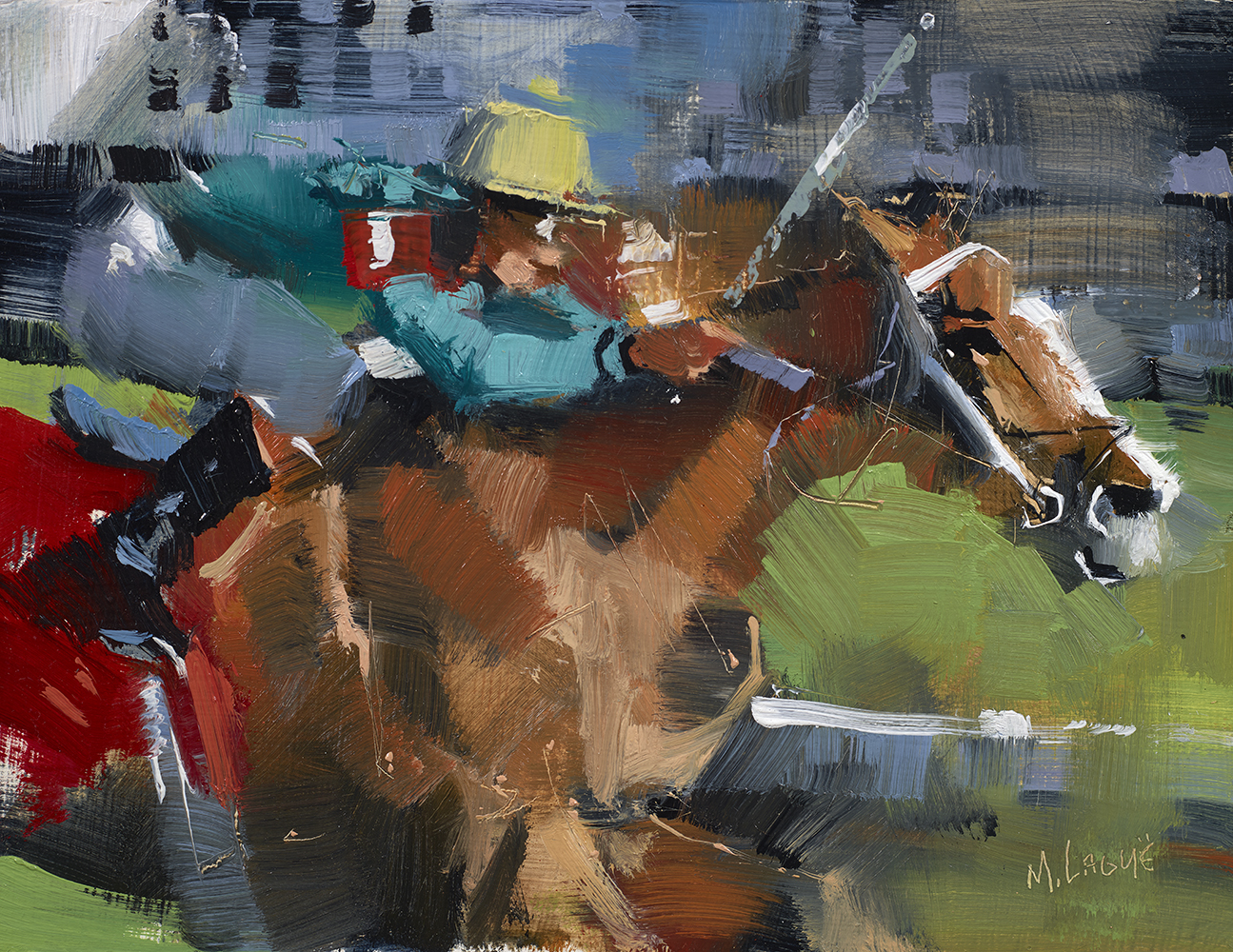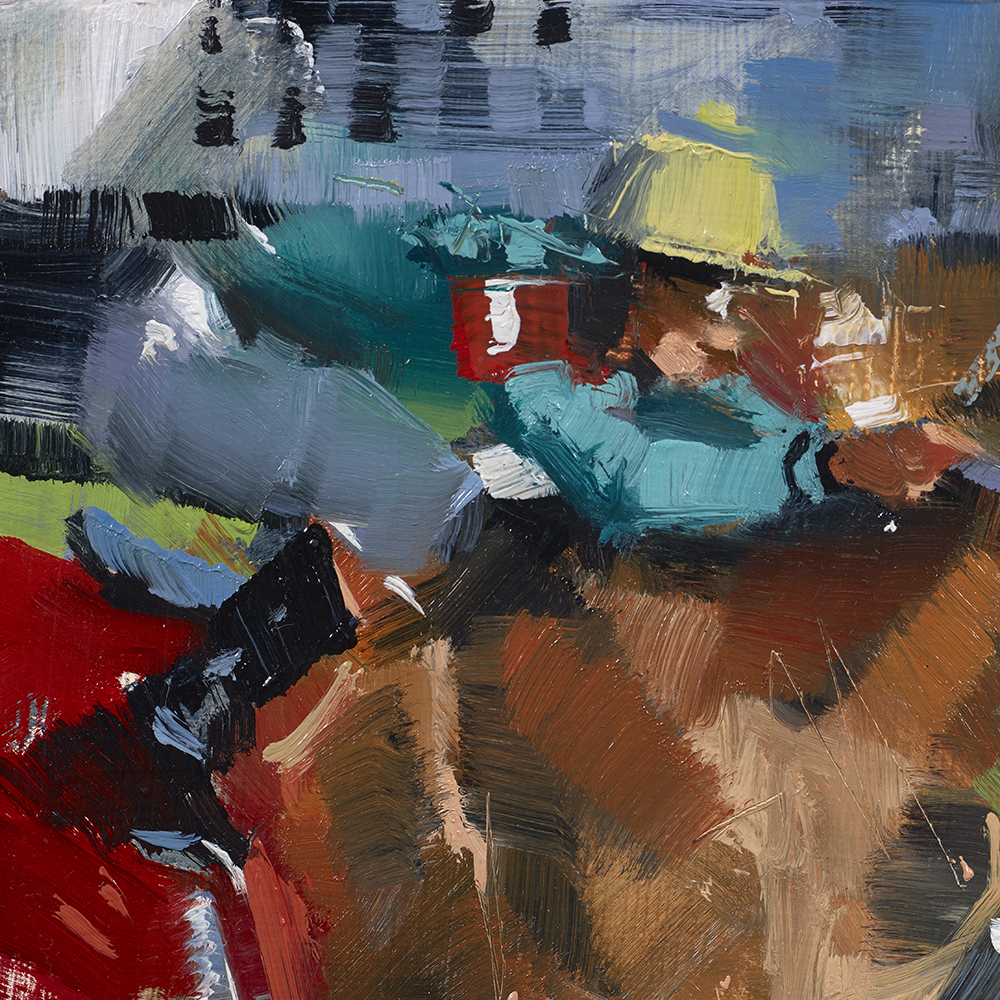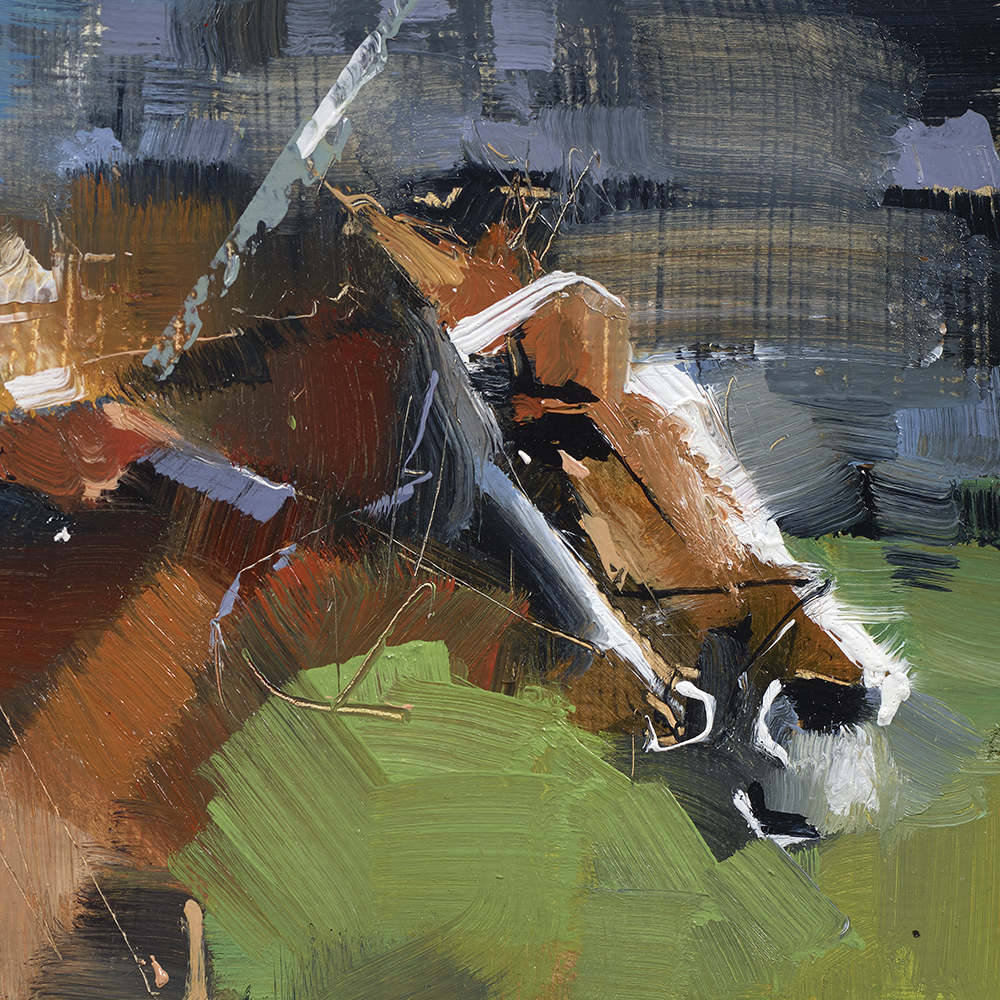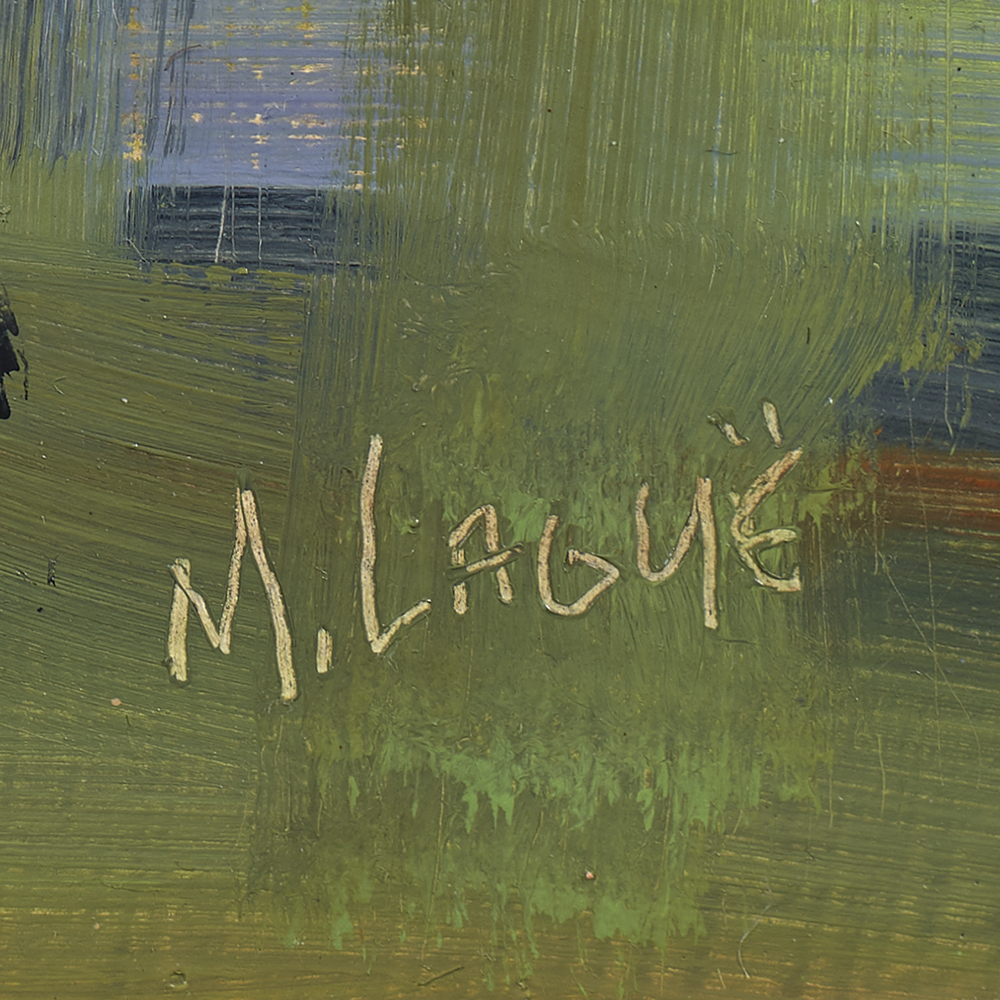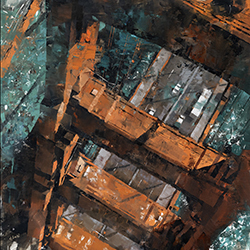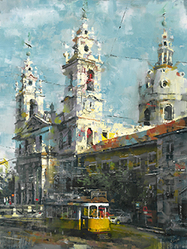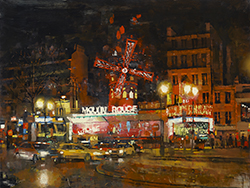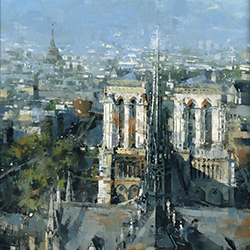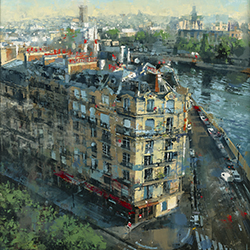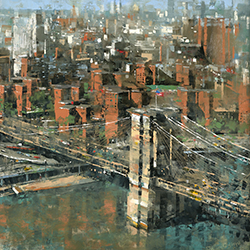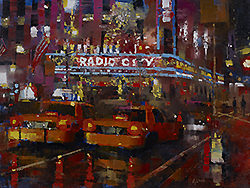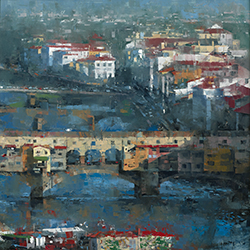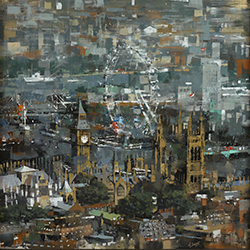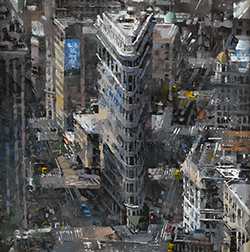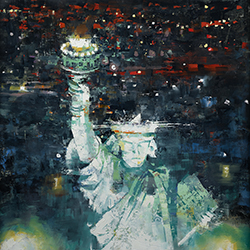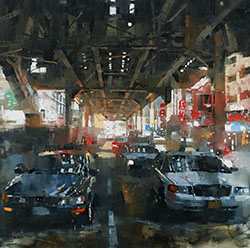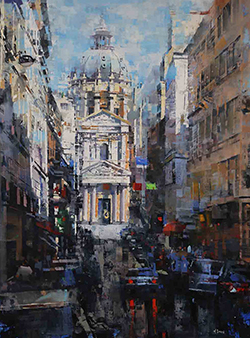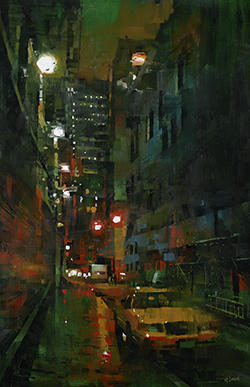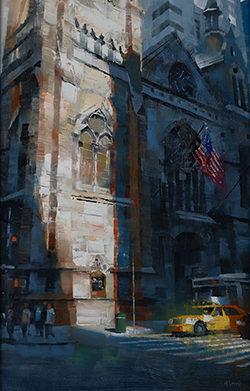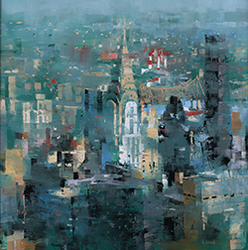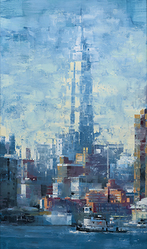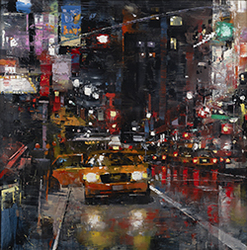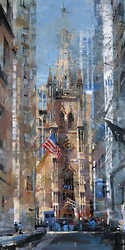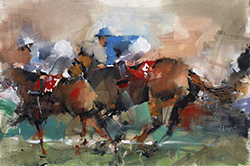Mark Laguë
(Born 1964)
Thoroughbreds Three
Oil on panel
8 x 10 inches
Signed
BIOGRAPHY - Mark Laguë (Born 1964)
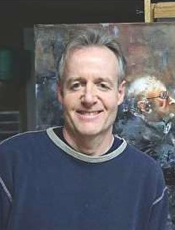
Raised in Dollard-des-Ormeaux, Québec, a suburb of Montreal, Mark Laguë enjoyed a sports-oriented childhood, playing hockey and baseball along with his two brothers and three sisters. Although cultural activities and the arts were not particularly emphasized in his family, Laguë took an early interest in drawing, commenting that he was “always doodling and drawing...on books or desks or anything.” It was not until his last year of high school, however, that he received any formal instruction in the visual arts; and his aptitude for drawing so impressed his teacher that she encouraged him to continue studying art after graduation.
When he graduated at age sixteen, Laguë moved on to the educational program known as CEGEP (Collège d'enseignement général et professionnel). This is a two-year program unique to the province of Québec which replaces the period that would typically be identified as the senior year of high school and the freshmen year of university. It is intended to allow students to prepare more thoughtfully for university- level work.
With the encouragement of his parents, Laguë began his studies as a fine arts major at John Abbott College in 1981. Located adjacent to the campus of McGill University’s Macdonald College in Montreal’s West Island community, John Abbott College had been accredited as a CEGEP school in 1970. There, Laguë was introduced to a formal course of study in drawing, painting, printmaking and art history, working with the artist Steve Bloomer (1920-2005), who had helped to establish the visual arts curriculum for the college when it first opened. Laguë recalls him fondly, noting that he was a “great teacher”.
As a student, Laguë hoped to establish a career as an illustrator and he recognized the importance of strong drawing skills as a foundation for building that future. He remarks that his parents instilled a strong work ethic in him and his siblings, in part by setting an example in their own lives. When he finished his two-year CEGEP education, Laguë continued to study art, but also went to work at the local Sears warehouse to pay the bills. From 1983-84, he enrolled in a number of classes at the Visual Arts Center (VAC), an independent art school that offered courses at all levels of instruction. With a flexible schedule that could dovetail with his warehouse job, the VAC was an ideal program for a young artist to refine his artistic skills and knowledge. As a result, he began to think more seriously about art as a career.
By 1985, he had begun his final stretch of formal art education at Concordia University in Montreal where he received his BFA in Design three years later. The highlight of these years was the live model studio time on Thursday evening and Friday afternoon. Laguë remembers these studios as central to his art education; each model would pose for a time-period of thirty seconds to five minutes. Students had to capture the essentials of each pose quickly, training their eyes and hands through repetition and intense focus. There was no formal supervision beyond the imperative to “just draw”. Laguë loved it.
As he was completing his last year of study, Laguë noticed a job ad on a school bulletin board; he applied for the position and started working for Pedie Pedia Animation two months before he graduated. Although it was an informal three-person firm, Pedie Pedia gave him an introduction to animation. He prepared the backgrounds for 26 ten-minute educational films, and more importantly, began to establish himself within the animation industry of Montreal. Within two years, he was working as a contract employee for Ciné-Groupe Animation, a “real animation studio”. This furthered his knowledge of the business of animation and paved the way for his eventual move to Cinar Animation in 1989.
As he was finishing his schooling, he also met the young woman who would eventually become his wife. When he and Lori married in 1993, Laguë was an established commercial artist working for Cinar Animation as a background designer and art director. Throughout these years, however, he also maintained his practice of drawing and painting watercolors.
In 1996, he started to exhibit his work in a small gallery in Lancaster, Ontario. This experience also served as his inauguration to the art market and gallery business practices. An initiation of another sort arrived on Christmas Eve with the birth of his son. The following year, he began teaching watercolor painting classes at the Dollard Civic Center in Dollard-des-Ormeaux.
Although it may not have appeared to be a turning point at the time, the waning years of the twentieth century contained the seeds of Laguë’s career as a full-time painter. The century closed happily with the birth of his daughter in 1999, but the twenty-first century opened with a significant—and very public—embezzlement scandal at Cinar Animation. The scandal unfolded over the course of a few years, ultimately ending with the destruction of the company. Before that eventuality, Laguë had already decided to become a full-time painter.
He had prepared the ground for his career shift by entering a number of juried exhibitions in the US, focusing on both watercolor and oil painting shows. In 2002, he won an award at the Oil Painters of America-Eastern Regional exhibition, and came to the attention of the Brazier Art Gallery of Richmond, Virginia. That led to his first solo show in 2004, followed by another solo exhibition in Santa Barbara, California the following year. For the next five years, Laguë’s career as a professional painter thrived; there were more solo shows in Richmond and Santa Barbara, but also in Boulder, Colorado, Scottsdale, Arizona, and in several galleries in Québec and Ontario. Likewise, he was a participant in a number of juried shows for the Oil Painters of America, the American Watercolor Society and the American Artists Professional League annual exhibition at the Salmagundi Club in New York.
The future looked very bright until the advent of the recession in 2009 when the economic downturn dealt a severe blow to the market for most art. Laguë was fortunate that his wife’s work remained steady, but the next few years were financially bleak. Since 2012, with the return of stable economic growth, the market for Laguë’s work has regained a healthier position.
He works primarily in oil now, typically painting cityscapes and occasional figural scenes. Laguë strives for originality, noting that “honest work is best”, eschewing iconography for abstraction. Over the years, he has become more and more of a studio painter as his work has become looser. When asked about how he sees his work developing, he replies that he hopes to keep simplifying it, adding that “growth is slow and must be both earned and meaningful.”
Janet Whitmore, Ph.D.
Juried Exhibitions
Oil Painters of America 2005
Hilligoss Gallery - Chicago Illinois
Oil Painters of America 2004
Howard/Mandville Gallery - Kirkland Washington
Salon International 2002, 2003, 2004
Greenhouse Gallery - San Antonio Texas
2004 Plein Air Magazine Publisher's Award
American Watercolor Society Annual Exhibition 1996, 2003
Salmagundi Club - New York New York
Oil Painters of America 2002
Brazier Fine Art - Richmond Virginia - Award of Excellence
American Artists Professional League Annual Exhibition 1996, 2002
Salmagundi Club - New York New York - 2002 American Artists Fund Award
| AVAILABLE WORKS | |||||||||||||||||||||

